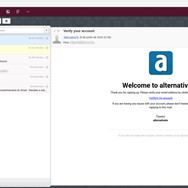
Disroot
Disroot is a Free and Open-Source Software (FOSS) project offering privacy-focused online services, primarily secure email, alongside collaborative tools like cloud storage, document editors, and file sharing, all under a strong commitment to user anonymity and decentralization.
About Disroot
Pros & Cons
Pros
- Strong emphasis on user privacy and anonymity.
- Completely ad-free and no tracking.
- Based on Free and Open-Source Software (FOSS).
- Integrates multiple useful privacy-focused services.
- Supports standard email protocols for client compatibility.
- Community-driven and transparent.
Cons
- May have a learning curve for integrated services.
- User interface is functional but less polished than some commercial products.
- Support is primarily community-based.
- Reliance on community resources for extensive tutorials or troubleshooting.
What Makes Disroot Stand Out
Comprehensive Privacy Suite
Offers a range of integrated, privacy-focused services beyond just email, creating a more complete private online presence.
Commitment to FOSS and Decentralization
Built entirely on free and open-source software with a decentralized architecture, promoting transparency, security, and user control.
No Tracking, No Ads
Ensures a user experience completely free from tracking and advertisements, prioritizing user data and privacy over monetization through personal information.
Features & Capabilities
23 featuresExpert Review
Disroot: A Privacy-Focused Online Service Ecosystem
Disroot presents itself as a compelling alternative for individuals seeking to move away from corporate online services and regain control over their data and privacy. At its core, Disroot provides a robust email service, accessible through standard protocols like IMAP, POP3, and SMTP, as well as a clean web interface. The emphasis on privacy is immediate and evident, with a clear stance against tracking and advertising – a significant departure from many popular free email providers. Beyond email, Disroot excels by integrating a suite of open-source tools that collectively form an ecosystem focused on privacy and collaboration. The inclusion of Nextcloud provides users with secure cloud storage, allowing for file synchronization and sharing without relying on proprietary services. Collaborative document editing is facilitated through Etherpad and Ethercalc integrations, enabling real-time co-authoring of text documents and spreadsheets in a private environment. Secure file sharing is handled by Lufi, offering a simple yet effective way to send files privately. The project further enhances its utility with integrations for a pastebin service (PrivateBin), a private meta-search engine (Searx), a project management tool (Taiga), and even a platform for forums and community building (Discourse). This integration of multiple services under a single, privacy-respecting umbrella is a major strength of Disroot. It allows users to consolidate many of their online activities within a trusted, open-source environment. A key aspect of Disroot's appeal is its foundation in Free and Open-Source Software (FOSS). This commitment means the codebase is openly available for inspection, fostering transparency and allowing the community to identify and address potential security vulnerabilities or privacy concerns. The decentralized nature of some of the integrated services also contributes to a more resilient and censorship-resistant platform. The user interface, while functional, tends towards simplicity and may not have the polished look and feel of some commercially developed applications. This is often a trade-off for FOSS projects prioritizing function and privacy over purely aesthetic design. However, the webmail interface is intuitive and easy to navigate, and compatibility with standard email clients ensures users can utilize familiar software if they prefer. One potential consideration for users accustomed to the extensive features of some mainstream platforms might be the learning curve associated with the integrated services. While the services themselves are generally user-friendly, understanding how they connect and function within the Disroot ecosystem might require some initial exploration. Support for Disroot is primarily community-driven, which is typical for FOSS projects. While active and helpful, this model might differ from the dedicated, immediate customer support offered by commercial providers. Documentation is available, and the community forums are a valuable resource for assistance. In summary, Disroot is a robust and principled alternative for those prioritizing online privacy and seeking a suite of integrated, open-source services. Its commitment to no tracking, no ads, and FOSS principles makes it a strong contender for individuals and organizations looking to reduce their reliance on data-hungry corporations. While it may require a slight adjustment for users new to open-source ecosystems, the benefits in terms of privacy, security, and control over one's data are significant.Similar Apps
Compare features and reviews between these alternatives.



